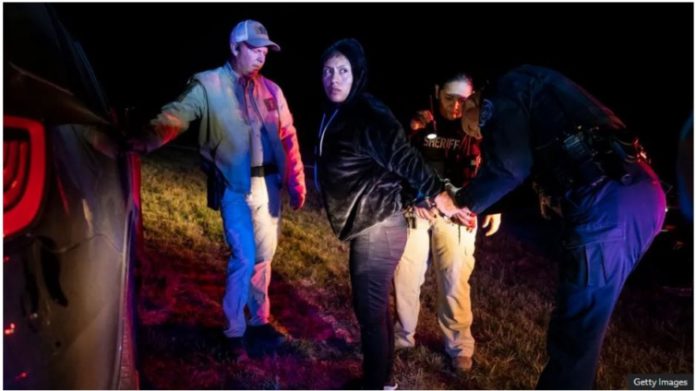
The Supreme Court has allowed Texas to enforce one of the toughest immigration laws enacted by any US state in recent memory.
The measure allows police to arrest and prosecute those suspected of illegally crossing the US-Mexican border.
The Biden administration has challenged the law, calling it unconstitutional.
Crossing the US border illegally is already a federal crime, but violations are usually handled as civil cases by the immigration court system.
One reason the Texas law, SB4, is so controversial is because courts have previously ruled that only the federal government can enforce the country’s immigration laws, not individual US states.
SB4 gives local and state police officers the ability to stop and arrest anyone suspected of having crossed the border illegally, except in schools, healthcare facilities and places of worship.
Punishments would range from misdemeanours to felonies and potential imprisonment, or fines of up to $2,000 (£1,570).
Penalties for those who illegally re-enter Texas after having been deported could go up to 20 years in prison, depending on a person’s immigration and criminal history.
On Tuesday, the Supreme Court said the measure can take effect while a lower federal appeals court weighs its legality. A day earlier the nation’s highest court placed a temporary pause on SB4.
President Joe Biden’s White House sharply criticised the latest decision.
“SB4 will not only make communities in Texas less safe, it will also burden law enforcement, and sow chaos and confusion at our southern border,” White House press secretary Karine Jean-Pierre said in a statement.
But Texas Attorney General Ken Paxton hailed the Supreme Court decision as a “huge win” against the Biden administration and the American Civil Liberties Union (ACLU), which has also challenged the law in court.
“As always, it’s my honor to defend Texas and its sovereignty, and to lead us to victory in court,” he wrote in a post on X, formerly Twitter.
The ACLU vowed that it “won’t back down until this extreme anti-immigrant law is struck down for good”.
Top Mexico diplomat Roberto Velasco Álvarez posted on X that Mexico will not accept migrants being sent back across the border by the state of Texas.
“The dialogue on immigration matters will continue between the federal governments” of Mexico and the US, he wrote in Spanish.
The court’s three liberal justices – Sonia Sotomayor, Elena Kagan and Ketanji Brown Jackson – disagreed with the majority ruling.
“The court gives a green-light that will upend the longstanding federal-state balance of power and sow chaos,” Justice Sotomayor wrote in the dissenting opinion.
She also wrote that the law could “disrupt sensitive foreign relations, frustrate the protection of individuals fleeing persecution, hamper active federal enforcement efforts” and keep migrants from reporting abuse or trafficking.
As well as arguing that SB4 infringes on the federal government’s authority to secure the US border, the justice department has warned it could harm relations with Mexico, which has condemned the law as “anti-immigrant”.
Historically, the federal government has created laws and regulations on immigration, even though the US Constitution does not explicitly grant it those powers.
It is also the federal government which negotiates treaties and agreements with other countries.
SB4 was signed into law in December and was initially due to come into effect on 5 March.
The case will now head back to a three-judge panel from the New Orleans-based US Court of Appeals for the Fifth Circuit.
Following the Supreme Court decision, the appeals court said it would hear arguments on Wednesday.
Whoever loses there would have the option of taking the case back to the Supreme Court.
The implementation of SB4 comes amid rising public concern over the US-Mexico border.
A Gallup poll released in February showed that nearly one-third of Americans believe immigration is the single greatest problem the country faces, ahead of the government, the economy and inflation.
ALSO READ:






